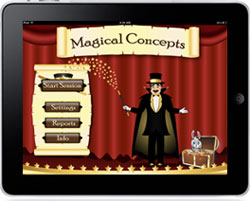Sometimes I feel like the Simon Cowell of app reviewers. When some rave about an app, I am left feeling disappointed. Then I feel like I need to apologize for not liking an app that others love. I do like to give good reviews because I know that developers have the best of intentions when trying to provide apps that will be useful. They also invest time and money. Plus, I know that many of us are eager to have really good professional apps in our therapy arsenal.
Those of you who have read my earlier blogs, How Effective Is the iPad as a Therapy Tool, Minimal Pairs App, and Is the iPad Worth the Investment, have read that voice recognition technology is highly inaccurate. The technology works best when it recognizes the user and when it analyzes large communication segments, such as words in phrases. The finer the analysis needed the less accurate the technology becomes. This means that voice recognition technology is highly unreliable when it comes to analyzing sounds in words, syllables and in isolation. I have examined two apps that target sound production. One relies on the adult to determine whether or not the phoneme is correctly produced and rewarded. For the other, voice recognition is an integral part. This difference is critical. Speech Stickers: This app was developed by speech pathologist Carol Fast. This app targets the following sounds: /m/, /p/, /b/, /t/, /d/, /n/, /k/, /g/, /s/, /ʃ/. These phonemes are practiced as either CV (consonant-vowel) or VC (vowel consonant). The vowels used in the app are: /ʌ/, /ɒ/ (shown as /a/ in the app), /u/, /i/ and /o/.
The workings of this app are straightforward. The app opens to a screen on which one can tap on play, options or instructions. Tap on play and a screen, with the first phoneme /m/, is displayed at the top of the screen accompanied by the narrator saying /m/. At the bottom of the screen are five faces: a girl, boy, alien, cat and monster. The child selects one of the faces. When the face is tapped, it appears on the middle of the screen and /m/ is said again. On the right side of the screen is a vertical bar, or meter, with numbers 0-5 in ascending order. The goal is for the child to produce the sound five times. Each time the child produces a sound, the adult either taps on the green check mark, for a correct repetition or red X if incorrect. Either the check mark or the X must be tapped for the face to show up on the meter and for the sound to be produced again. This level of control allows the adult to carefully monitor the child’s production and give feedback before the game can progress. Once the five repetitions are noted as either correct or incorrect, a new screen, with 10 objects (rocket, hiking boot, bomb, shark head, bus, train, tractor, wand, balloon and a dragon), appears at the bottom of the screen. The child taps on the picture of choice and watches as the object performs a short action.
If one wishes to switch sounds or work on the sound in syllables, one taps twice on the phoneme at the top of the screen. (I like the idea of tapping twice to keep the quick tapping fingers of children from making the changes.) This opens a screen showing all the targeted apps as well as the sound in CV and VC. One can switch phonemes or select to work at the syllable level by tapping on a specific syllable. There is a scoring feature for each screen. As noted above, the child’s production is marked as correct or incorrect. The number of correct is tallied and shown as a percentage for only that screen. There is no database to refer to at another time. Also, the app can be used only in vertical position.
I like that care is given to the production of the target sounds; their clarity in isolation and syllables is good overall. The graphics and animations are basic.This app can be used with children who are at the beginning levels of learning a new sound. I can see the app being used as a fun diversion from basic sound and syllable repetition that is typical at the early stages of phoneme learning.
Ages: 3-5 years
Ratings: +++
Developer website: Serioustree.com
Cost: $14.99
Tiga Talk has serious limitations as a speech app. For children who can easily say the sounds without error, it can be a fun game that children will enjoy.
Ages: 3-6 years
Ratings: +1/2
Developer website: tigatalk.com
Cost: $4.99

